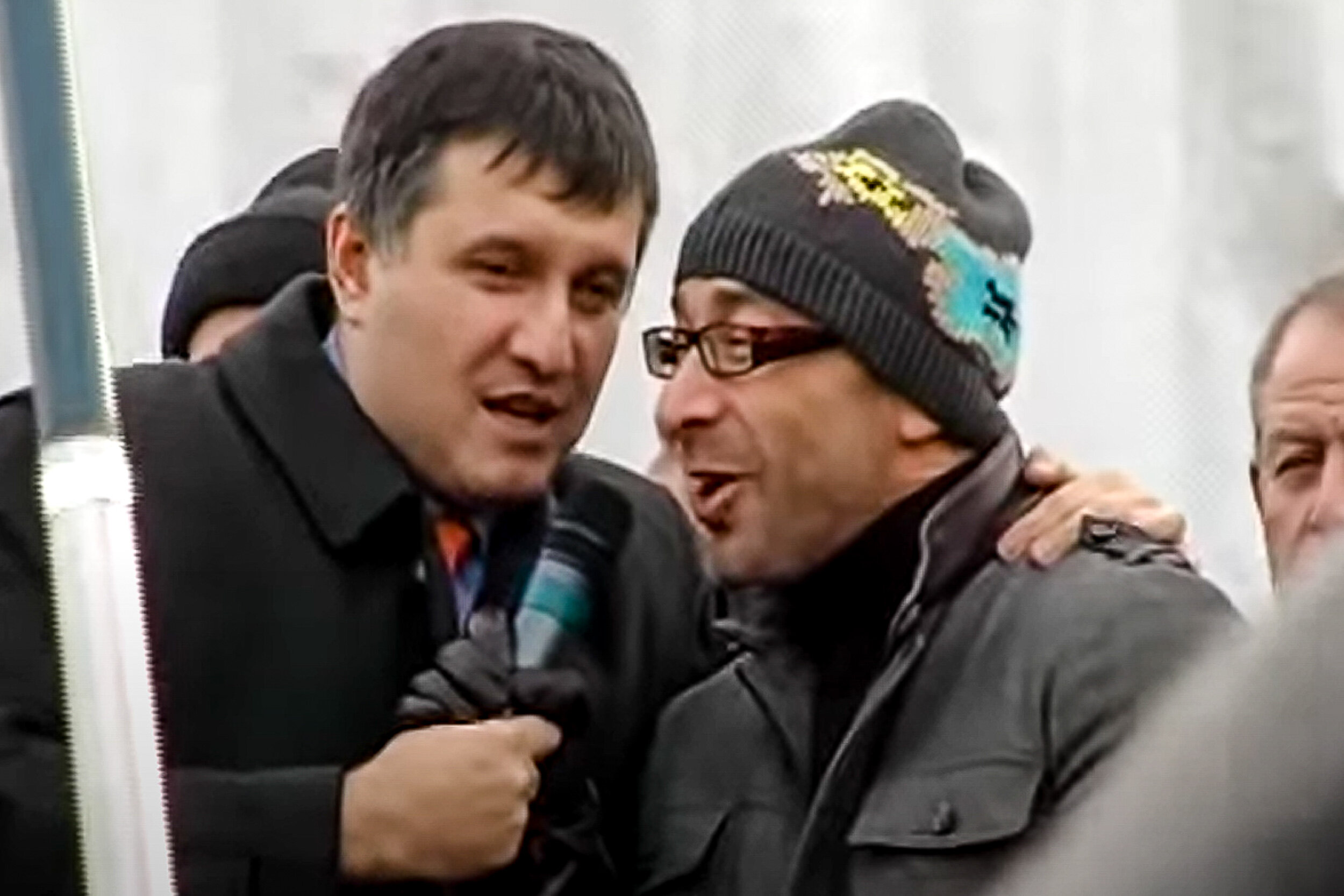Read a related story here.
Interior Minister Arsen Avakov’s road to power in Kyiv was long and began in his regional base of Kharkiv in the “wild 1990s.”
His career is typical for a businessman-turned-Ukrainian politician rooted in a period of chaos and lawlessness. In the nearly 30 years since Ukraine’s independence, he has built ties with people at the top and exploited the 2004 and 2014 revolutions for his political benefit.
Kharkiv businessman
An ethnic Armenian born in the Azerbaijani capital of Baku in 1964, Avakov moved to Ukraine when he was 2.
During the Soviet era, he worked as a mechanic. With the collapse of the Soviet Union, he launched his business career in the early 1990s in Kharkiv, Ukraine’s second city with 1.5 million residents located 500 kilometers east of Kyiv. He founded the Investor Group and Bazis Bank, stepping stones to his political career.
“Avakov is a person from the 1990s with all the aspects characteristic of that period,” Dmytro Bulakh, head of the Kharkiv Anti-Corruption Center, told the Kyiv Post.
Oleksandr Konovalov, initially his main business partner, was killed in 1992. Businessman Leonid Roitman and Gennady Kernes, now mayor of Kharkiv, have accused Avakov of killing Konovalov to take over his assets — an allegation the interior minister denies. He was investigated in the case, but the murder remains unsolved.
Avakov created his business in Kharkiv during the tenure of Yevhen Kushnaryov, the city’s mayor in the early 1990s. Kushnaryov later served as President Leonid Kuchma’s chief of staff from 1996 to 1998 and governor of Kharkiv Oblast between 2000 and 2004.
Bulakh said that Avakov received access to major assets in Kharkiv thanks to Kushnaryov, killed in 2007 in a hunting accident.
In the 2000s, Avakov entrenched his influence in the city by acquiring television channels, newspapers and a news agency.
Going national
He also enjoyed close relations with one of Kushnaryov’s successors — Volodymyr Shumilkin, Kharkiv’s mayor from 2002 to 2006.
“Shumilkin brought Avakov to power,” political analyst Volodymyr Fesenko said. “I saw with my own eyes Shumilkin bringing Avakov to the Verkhovna Rada in early February 2005.”
Both Shumilkin and Avakov supported the Orange Revolution. The event proved to be Avakov’s personal milestone, turning him from a regional businessman into a politician with nationwide clout. The revolution was triggered by voting fraud in favor of pro-Russian presidential candidate Viktor Yanukovych and culminated in a rerun vote which brought pro-Western Viktor Yushchenko to power.
Avakov also got a career boost when he developed ties with Yushchenko’s nephew Yaroslav and with Yaroslav’s father Petro Yushchenko. Yushchenko appointed Avakov as governor of Kharkiv Oblast and he stayed in office until 2010. Yaroslav Yushchenko was one of Avakov’s deputies from 2005 to 2006.
“He acquired close contacts with Yushchenko’s family,” Fesenko said. “He mostly focused on fighting (Yanukovych’s) Party of Regions in Kharkiv and was an active ‘orange’ governor.”
During the Orange Revolution, Avakov also allied himself with regional heavyweight Kernes, a Yushchenko supporter. Kernes was among the most powerful people in town, owning several hotels, factories and popular local news stations.

Arsen Avakov (L), then deputy head of Viktor Yushchenko’s Kharkiv election campaign headquarters, Gennadiy Kernes, then secretary of the Kharkiv City Council, attend a rally of Yushchenko supporters in Kharkiv in late 2004, during the Orange Revolution which led Yushchenko’s election as president. In 2014, Kernes accused Avakov of ordering an assassination attack on him. (Youtube)
Avakov and Kernes became enemies after Kernes switched his allegiance to Yanukovych in 2006. Kernes, now the mayor of Kharkiv, accused Avakov of being behind the attempt to assassinate him in 2014. Avakov always denied these accusations. The case was never solved.
After Yushchenko’s popularity waned and Yanukovych was elected president in 2010, Avakov found a new ally — ex-Prime Minister Yulia Tymoshenko — and became the head of her Batkivshchyna party’s regional unit.
Yanukovych era
Avakov’s political fortunes changed due to his conflict with Yanukovych.
In 2012, the Prosecutor General’s Office charged Avakov with abuse of power for allegedly illegally privatizing 55 hectares of government land worth more than Hr 5.5 million.
Avakov fled to Italy and was put on Interpol’s wanted list. An Italian court arrested him in 2012, but refused Ukraine’s extradition request.
Avakov said the case was a political vendetta by Yanukovych. Both Bulakh and criminal lawyer Vitaly Tytych argue that, regardless of the political motive, there is evidence that a crime had been committed by Avakov as part of the land scheme.
“It was a crime, although there was also a political motive (on Yanukovych’s part),” Bulakh said. “It was not a fabricated case.”
Avakov returned to Ukraine during the 2013–2014 EuroMaidan Revolution which ousted Yanukovych and ushered him into office.
Arsen Avakov’s path from Kharkiv to Kyiv
2002 – appointed to the Executive Committee of the Kharkiv City Council.
2004 – appointed deputy head of the Kharkiv Oblast campaign headquarters of presidential candidate Viktor Yushchenko during the 2004 presidential elections.
2005-2010 – serves as governor of Kharkiv Oblast.
2010 – backs Yulia Tymoshenko during the 2010 presidential elections. She loses to Viktor Yanukovych.
April 21, 2010 – joins Tymoshenko’s Batkivshchyna party.
2012-2014 – represents Batkivshchyna in parliament.
Feb. 22, 2014 – appointed acting interior minister.
Feb. 27, 2014 – appointed interior minister in the government of Arseniy Yatsenyuk.
Dec 8, 2014 – reappointed interior minister in the government of Arseniy Yatsenyuk.
April 14, 2016 – reappointed interior minister in the government of Volodymyr Groysman.
Aug. 29, 2019 – reappointed interior minister in the government of Oleksiy Honcharuk.
March 4, 2020 – reappointed interior minister in the government of Denys Shmyhal.
